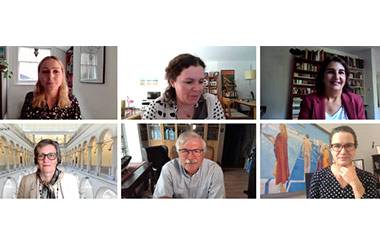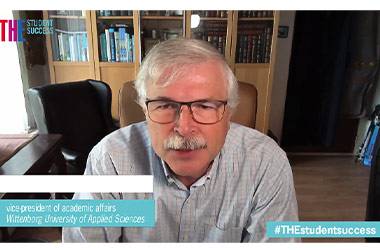University Leaders from Across Europe Reflect on Lessons Learned from Pandemic

Wittenborg Vice-President Part of Panel Discussion on Education Strategies for Future
A select group of university leaders from across Europe, including Wittenborg's Vice-President of Academic Affairs Professor Dr Ron Tuninga, took part in an online panel discussion this week on how lessons learned from the pandemic period is informing their education strategies for the future. The pros and cons of hybrid learning in particular was a big discussion point.
The discussion was hosted by British weekly Times Higher Education (THE) as part of their Student Success Forum event. The session was titled "Leaders Panel: Education Strategies for the Year Ahead".
Tuninga said one of the interesting things for students was that Wittenborg was able to invite more business leaders as guest speakers online. "Everyone is now more comfortable with Zoom and while in the past it took time to travel to the campus and deliver a lecture, they are now more willing to do an hour online without the travelling, and this allows for a more diverse group of practitioners from industry.
"Coming back from the pandemic, and the introduction of online learning, students now expect a much more active engagement experience and are allowed to watch or re-watch the lecture in their own time. This allows not just for more interesting group work, but also the ability to bring students from multiple campuses like we have at Wittenborg together. And I think there is even further opportunity to bring students from different universities together."

Wellness Centre for Students
As far as supporting students outside the classroom goes, Delphine Manceau, Dean of NEOMA Business School in France, said that four years ago they created a wellness centre, which included medical and financial aid, and this became very important for students over the past two years. "For instance, students who lost their jobs during the pandemic and needed financial help could come here, and it also played an important role in making connections with other students and staff where they could share meals and arrange activities like concerts. I think the centre is something that should really remain."
Dr Aune Valk, Vice-Rector of Academic Affairs at the University of Tartu in Estonia, said they noticed that the two groups suffering the most during the pandemic were first-year students and international students, and they also experienced the most dropouts from these two groups. Social science students also had it easier than natural science students, "who felt they lost something" in terms of their studies.
Prof. Dr Catherine Léglu, Vice-Rector of Academic Affairs at the University of Luxembourg, said as a tri-lingual institution they learned that language support was very important as well as supporting applied sciences students. "One group we tended to overlook was those students who need access to archives and libraries. Thank goodness for digitisation campaigns, but they were still at a considerable disadvantage."
Tuninga said about 90% of Wittenborg students come from outside the Netherlands. "An interesting new side effect was that usually students from outside the Netherlands would need a visa and that might not come in time, or during the pandemic some students had to go into quarantine. This would often mean they would miss a week or two of classes. Online classes helped them not to fall behind. To me it's not about hybrid learning - it's about learning and what we have to do in different situations to make sure students still get the best possible learning experience."
Prof. Dr Sarah Springman, Rector of ETH Zurich in Switzerland, said with hybrid classes they found having an assistant helping the lecturer by managing the online chat and filtering questions really valuable.
WUP 30/9/2021
by Anesca Smith
©WUAS Press